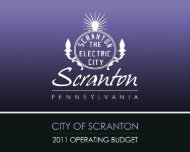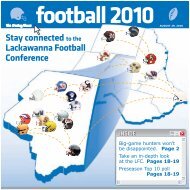racetracks
I want to be left alone! - The Times-Tribune
I want to be left alone! - The Times-Tribune
- No tags were found...
Create successful ePaper yourself
Turn your PDF publications into a flip-book with our unique Google optimized e-Paper software.
Congress mulls Health Savings Account (HSA) options<br />
By Bernard J Healey, Ph.D.<br />
A recent study, published in the journal,<br />
Health Affairs, has concluded that<br />
healthcare spending is greater than the<br />
services Americans receive for the<br />
money they spend.<br />
In response to this healthcare cost escalation,<br />
the United States Congress is<br />
attempting to pass new legislation allowing<br />
Americans to establish Health Savings<br />
Accounts (HSA) or Health Savings<br />
Security Accounts (HSSA).<br />
Legislation added to the recently passed<br />
House Medicare reform bill would allow<br />
more companies to offer these accounts.<br />
According to Otto F.Wolke, R.Ph, president,<br />
Schellen and Partners USA Inc.,<br />
healthcare consultants,“Medical Savings<br />
Accounts were part of the HIPAA legislation<br />
of 1996 and new proposals, called<br />
Health Savings Accounts and Health<br />
Savings Security Accounts are being considered<br />
in Congress at this time.While<br />
being touted as vehicles for consumerdirected<br />
healthcare, only about 100,000<br />
accounts have been started under the<br />
HIPAA legislation that had authorized up<br />
to 750,000 accounts.<br />
“For employers and for healthy families<br />
that have the money to put into the<br />
accounts, there are advantages. Money<br />
can be saved and rolled over. In the<br />
inverted bell-shaped curve of healthcare<br />
utilization, these accounts are targeted for<br />
population with much less medical risk.”<br />
Wolke argues that “the insurance companies<br />
win with minimal utilization of<br />
services and lower administrative costs of<br />
handling small claims.The employers win<br />
with a large reduction in healthcare premiums<br />
paid.The healthy employee wins<br />
with the freedom of choice in who to see<br />
and what to spend the healthcare dollars<br />
on, or to keep the money growing in the<br />
MSA account. Financial services companies<br />
also win with more private money<br />
going into investments with subsequent<br />
administrative fees.”<br />
Wolke contends that “the losers are<br />
moderate to low-income individuals who<br />
find it difficult to fund the accounts or to<br />
pay bills prior to having fully funded the<br />
MSA.Young and growing families who<br />
would face large out-of-pocket expenses<br />
with unexpected emergencies or a pregnancy.<br />
Other losers are enrollees with<br />
chronic diseases that require expensive<br />
medication, since these plans have no<br />
drug benefit, and drugs are the fastest<br />
growing segment of healthcare inflation.<br />
Persons who experience frequent hospitalizations<br />
or physician office visits are also<br />
at risk for significant out-of-pocket expenses<br />
that will wipe out the savings account<br />
and leave the patient at risk for costs.”<br />
He explained that “there is often no maximum<br />
out-of-pocket expense, which is part<br />
of most current healthcare insurance programs.The<br />
MSA process takes funds from<br />
the healthcare delivery system and creates<br />
additional savings pools for wealthier individuals<br />
who can afford to pay incidental<br />
healthcare out of pocket and keep the<br />
MSA account for retirement.”<br />
James Davis, government affairs representative,<br />
Blue Cross of Northeastern<br />
Pennsylvania, says “these new proposals<br />
improve current medical accounts by<br />
removing many of the barriers that limited<br />
their use and effectiveness.”<br />
He said current proposals allow employees<br />
to build assets in Health Savings<br />
Accounts through employer contributions,<br />
employee contributions and taxfree<br />
rollovers of a portion of unused flexible<br />
spending account balances.”<br />
Davis went on to say “ insurers such as<br />
Blue Cross of Northeastern Pennsylvania<br />
hope that Congress would go even further<br />
in giving employers and health plans<br />
the flexibility to develop the widest possible<br />
range of products, for instance by<br />
eliminating the requirements that HSSAs<br />
and HSAs must be coupled with plans<br />
that have specific deductible amounts.”<br />
He also stated that “the HSSA accounts<br />
were scored by the Joint Committee on<br />
Taxation as costing much more than<br />
HSAs (roughly $160 billion versus $7 billion<br />
over 10 years), Blue Cross hopes<br />
Congress will consider both products’<br />
potential for advancing consumer-directed<br />
care.With consumers’ healthcare costs<br />
rising, it is more important than ever to<br />
work toward supporting marketplace<br />
innovations that will lead to greater flexibility<br />
and more choices for consumers.<br />
This legislation is an important step<br />
toward increasing consumer choices and<br />
access to healthcare. It will allow health<br />
plans to develop new coverage options<br />
designed to empower consumers and<br />
expand their health coverage.”<br />
Area firm helps to beautify Arlington National Cemetery<br />
Michael Kravitsky, IV, co-owner; Shawn<br />
Kravitsky, co-owner; and Victor Gorski,<br />
sales manager, of Grasshopper Lawns<br />
Inc. of Larksville, traveled to Washington,<br />
D.C., this summer to team up with lawn<br />
and landscape experts from around the<br />
nation in a day of voluntary service beautifying<br />
and restoring the cemetery<br />
grounds at Arlington National Cemetery.<br />
The beautification activities were part of<br />
the Professional Lawn Care Association<br />
of America’s (PLCAA) 14th annual legislative<br />
day on the Hill in July.<br />
Grasshopper Lawns, in business since<br />
1964, has been a PLCAA member since<br />
1980. For more information, call (800)<br />
287-6113. At left, Grasshopper works at<br />
Arlington National Cemetery.<br />
Extraordinary<br />
cancer care.<br />
WILKES-BARRE GENERAL HOSPITAL has always strived to<br />
provide its cancer patients with the best medical professionals,<br />
the latest technologies and the most advanced therapies.<br />
Today, those efforts have evolved into the region’s most<br />
comprehensive cancer care program.<br />
In addition to our leading edge technology in medical oncology<br />
and radiation therapy, we offer a dedicated 39-bed inpatient unit<br />
with skilled and compassionate physicians, nurses and support<br />
staff. It all adds up to expert, experienced cancer care.<br />
WILKES-BARRE GENERAL HOSPITAL –<br />
Fighting Cancer...<br />
with Capability,<br />
Commitment and<br />
Compassion.<br />
www.wvhcs.org<br />
26 • NORTHEAST PENNSYLVANIA BUSINESS JOURNAL • SEPTEMBER 2003




